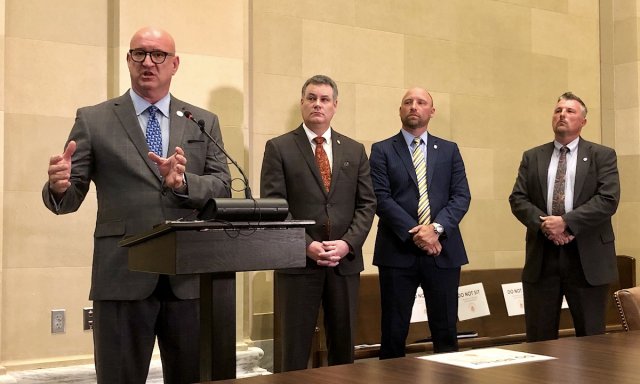
State officials announced two pieces of legislation this afternoon to authorize utilities, municipal power authorities, hospitals, school districts and other entities to securitize their gas-bill debts related to the historic February winter storm.
“It doesn’t directly obligate the authority of the state or the appropriations of the state. We think this is the best possible outcome in a bad situation,” said Secretary of Energy and Environment Ken Wagner. “It’s not without work, it’s not without figuring out that system and how it works for that particular municipal power authority, hospital or school district or whatever it might be.”
Securitization refers to the financial practice of pooling contractual debt and selling it on a secondary market. In this instance, the process will play out as follows:
- The Oklahoma Development Finance Authority will issue bonds for purchase
- Private investors will buy the low-interest bonds
- The ODFA will pay proceeds to the utility companies and other impacted entities
- Those impacted entities will pay off their debts to wholesale gas producers and sellers
- The impacted entities will pay back ODFA over time
- For utility companies like OG&E, ONG and PSO, those payments will come from higher charges to ratepayers, but the charges will be spread out over a longer period of time and at a lower rate than if the securitization plan were not in place.
State officials emphasized that utilizing the ODFA bonding authority will allow indebted entities to receive a lower interest rate on their loans, which will save ratepayers a significant amount of money.
“There are significant savings on the interest costs of these bills that have to be paid back,” said Assistant Attorney General Jared Haines.
More than $4.5 billion could be securitized
Sen. James Leewright (R-Bristow) and Rep. Garry Mize (R-Guthrie) have been leading legislative discussions on the securitization topic for the past six weeks. Leewright said Monday that the two pieces of legislation authorizing securitization of the debts will be Joint Committee on Appropriations and Budget vehicles and will likely be released before the end of Tuesday.
He also said the total amount of debt that could be securitized is more than $4.5 billion and that two pieces of legislation will be revealed, one authorizing regulated power and gas utilities to securitize their debt and another authorizing unregulated municipal power authorities, some nonprofit hospitals and even some school districts to do so.
Those entities are eligible if they had contracts “on those customer choice tariffs where they have complete market exposure,” said Brandy Wreath, public utility division director for the Oklahoma Corporation Commission.
Wreath presented a series of slides featuring financial estimates during Monday’s press conference. In a typical February, residential natural gas customers would pay about $100, or about $3.37 per unit.
He said that if the February storm’s historic spike in wholesale gas prices were passed “through traditional regulatory treatment” under a “fuel adjustment clause,” ratepayers would have seen an average bill of $1,967, or $92 per unit. Bills of that nature would go on for up to seven months.
RELATED
Oklahoma hospitals receive ‘exorbitant’ gas bills after winter storm by Tres Savage
Under the securitization proposal announced Monday, Wreath said the average ratepayer bill would climb to about $158, or $5.92 per unit.
The impact on many local power authorities would be even more significant if securitization were not allowed.
“They need a lifeline and the state is providing that because we are in a desperate need,” said Mike Fina, executive director of the Oklahoma Municipal League. “We are at a point where some of these bills are exceeding some of these small communities’ annual budget.”
Mize emphasized that the legislation — wording of which was not disclosed by the time of this story’s publication — will include safeguards, such as timely audits, vetting and analysis of regulated entities by the Corporation Commission and requirements that securitized debts be tied to specific dates of the February emergency for exact price calculation.
“This is not long-term indebtedness to the state. This is not going to be on the state’s balance sheet,” Mize said. “We are allowing for these costs to be spread out over time.”
Asked about Attorney General Mike Hunter’s past insinuation that some unregulated wholesale gas sellers had potentially violated price gouging laws, Haines declined to discuss his office’s ongoing investigation.
If the bills are ultimately passed by the Legislature and signed into law by Gov. Kevin Stitt, bonds could be issued before the end of the fiscal year.
The Oklahoma Development Finance Authority’s next regular meeting is scheduled for Wednesday, April 28.






















